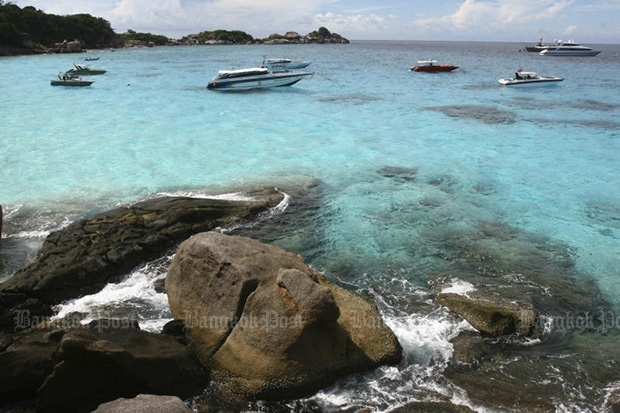
Phuket — After being warned of possible coral bleaching in Thailand as a result of El Nino last year, the Department of Marine and Coastal Resources says it is prepared to cope but may be forced to close affected coral reef sites.
The increasing temperatures in the Andaman Sea and the Gulf of Thailand earlier this month is a sign, said Nalinee Thongtham, the department's senior fishery biologist.
She said that the influence of El Nino has resulted in increasing seawater temperatures in the eastern Pacific which have remained longer than usual. Once the temperature declines, the mass of warm water moves to the western Pacific, accompanied with high seawater temperatures in the summer season.
This becomes a significant factor in stimulating the bleaching, the biologist added.
This is not the first case of bleaching in Thailand.
The natural occurrence took place in 1991, 1995, 2003, 2005 and 2007.
However, the worst case was in 2010 where 66.9% of coral reefs in the northern part of the Andaman Sea and 39% in the southern part died from bleaching.
The biologist said the recovery from 2010 is satisfactory in many areas but the department is concerned that these areas may soon be affected by new bleaching.
"If it happens in a very short period, there is a smaller impact to the coral reefs, which are very sensitive. Or the impact could be immense in which case stronger action is required to limit the problem," she said.
Pinsak Suraswadi, director of Marine Research Institute, said officials at five stations are closely monitoring seawater temperatures, four in the Gulf of Thailand and one in the Andaman Sea.
If the temperature rises to 30.5C in the Gulf of Thailand and 28C in the Andaman Sea, bleaching is likely to happen.
The department has prepared to close coral reef sites, using Section 22 of the 2015 marine and coastal management promotion law that gives the department the authority to manage marine resources and prevent areas from being severely affected.
The high number of tourists could worsen the bleaching. About 12 million tourists visit Phuket every year.
Sommai Plookmaidee, vice-president of Phangnga's Pru Nai tambon administrative organisation, voiced his concern that a huge number of tourists has had a significant impact on coral reefs.
In Koh Kai Nok alone, there are 300 speedboats carrying about 3,000 tourists every day. There are not enough buoys to service them, resulting in boats anchoring to coral reef sites.
Mr Sommai said he wants to see all stakeholders work together to limit the impact on coral reefs and to enact a recovery plan, including limiting the number of tourists and enforcing waste management at beachfront shops and restaurants.
He added that wastewater and garbage management is the TAO's top priority, to limit the impacts to the marine ecological system.
